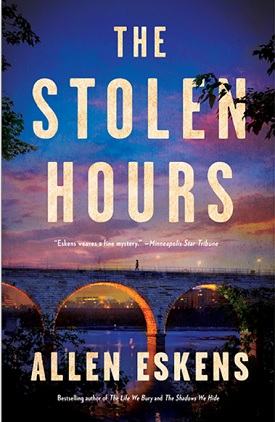 Synopsis:
Synopsis:
Lila Nash is on the verge of landing her dream job. She’s working as a law clerk while awaiting the results of the Bar exam. If she passes that rigorous test, she will become a full-fledged prosecutor under the Hennepin County Attorney. She has settled into a happy life with her boyfriend, Joe Talbert, the main character in The Life We Bury and The Shadows We Hide.
But when a woman is pulled from the Mississippi River, barely alive, things in the office take a personal turn.
The police believe the woman’s assailant is local photographer Gavin Spencer. But the case quickly flounders as the evidence against Spencer is thin. It seems that Gavin anticipated the investigation . . . and the police and prosecutors are stunned at how carefully he prepared by destroying any evidence pointing to him.
The more determined Lila is to put Gavin behind bars, the more elusive justice becomes. She’s battling a vindictive new boss and haunted by the ghosts of the unspeakable attack she suffered and had kept hidden for eight long years. Lila knows the clock is ticking down and she is in a race against an evil mastermind.
It will take everything Lila’s got to outsmart a killer . . . and escape the dark hold of her own past.
Review:

Author Allen Eskens holds a journalism degree from the University of Minnesota and a law degree from Hamline University. He was a criminal defense attorney in the Mankato, Minnesota area for twenty-five years. But he also spent twenty years studying the craft and writing for his own enjoyment. His life’s trajectory changed when he happened upon a quote from Letter to a Young Poet by Rainer Maria Rilke. The young poet asks how he will know if he is a writer, and Rilke responds, “Ask yourself in your most solemn moments, ‘Must I write?’ And if the answer is ‘yes,’ you are a writer and you should conform your life accordingly.” Eskens had a thriving career and growing family, but knew that the answer to that question was “yes.” He decided to see if he could get his work published and The Life We Bury was the result. He gave up his license to practice law in 2017, and is a highly successful full-time writer who has also published The Guise of Another, The Heavens May Fall, The Deep Dark Descending, The Shadows We Hide, Nothing More Dangerous, and his latest work, The Stolen Hours. He has received the Barry Award, Minnesota Book Award, Rosebud Award (Left Coast Crime), and Silver Falchion Award, and been a finalist for the Edgar Award, Thriller Award, and Anthony Award. His books have been translated into twenty-six languages. Eskens grew up in the hills of central Missouri but continues to reside in greater Minnesota.
The Stolen Hours is a new venture for Eskens because it features a female protagonist. Although the story is related via a third-person narrative, it is told from the perspective of Lila Nash. To prepare, Eskens listened to audio books written by female authors for more than a year in order to develop Lila’s voice and characteristics. He confesses that it “was a little nerve-wracking. . . . I wanted to really nail it as best I can as a male.”
Don’t confuse hatred for strength. The forgiveness isn’t for them. It’s for you.
That consternation arises, in part, from the way Eskens views his writing. He describes his books as “literary mysteries” that are “very character-driven.” Each book is comprised of two distinct parts. The plot, including numerous twists and turns, of course. But he says that “on the other side is the character arc — the crucible that the character will go through” over the course of the story. And he seeks to inject some “elevated prose.” His goal is for “the plot to pull readers forward really fast,” but he also wants “the character side to pull them in deep so that they feel emotion by the end of the novel.” To accomplish that, he outlines every book thoroughly so that he understands the story he will be telling “from beginning to end” before he starts writing. That way, he notes, he can make mistakes in plotting the tale before he has spent a great deal of time writing only to discover that the story is not workable and must be significantly revised. He also constructs detailed character profiles. “I come to writing as a daydreamer.” So, for instance, with The Stolen Hours, he asked himself, “Who is Gavin? What made him who he is? I really enjoy sinking into that.”
And readers will really enjoy sinking into The Stolen Hours, a riveting and deeply emotional story at the center of which is Lila, a budding criminal prosecutor whose career may derail before it gets started. Lila is in a happy relationship with Joe Talbert, but there are aspects of her past she has never shared with him. Eight years ago, Lila was brutally assaulted, but because of her past behavior, the police did not make finding her attackers a priority and they have never been brought to justice. She survived and completed her education, but she has “not healed, and deep down” she knows it. She is still dealing with the effects, including obsessive-compulsive behaviors such as counting the number of steps between locations in order to calm her nerves and bolster her confidence, and contemplates seeking further treatment. But her therapist enraged her when he counseled her that healing requires both patience and forgiveness. Instead, Lila fantasizes about finding and prosecuting the men who changed her on that fateful night.
Lila is bright and capable, and demonstrated her prowess when she assisted with a trial. But the managing attorney was the opposing counsel in that matter, and he is still stinging from that defeat. And determined to retaliate against Lila. He is unscrupulous and unethical, but powerful, and Lila must find a way to outwit him in order to be admitted to the Minnesota Bar and keep the job she loves. He has assigned her to a new supervisor, the demanding Andi Fitch, in order to build a paper trail that will justify terminating her employment.
Meanwhile, Gavin Spencer, a local photographer who lives comfortably on the six figure “allowance” he receives annually from his mother, is also clever and resourceful. Gavin has a pronounced speech impediment that makes his words sound “thick and damp like air seeping from a wet tire. A squishy lisp from a squishy man.” Like Lila’s boss, he holds grudges. And repays even small slights with deadly precision, deftly destroying even the most minuscule bits of evidence that might point back to him. He targets his victims and plans his revenge methodically. At the outset, a bridesmaid at the wedding Gavin is photographing has unwittingly become Gavin’s fifth victim. But no criminal is infallible and Gavin will make one mistake. It may prove sufficient to tie him back to the crime. When he realizes how he slipped up, he “wants to scream and punch the wall. He had forgotten all about that brief moment of hubris.”
“Literary mystery” is an apt description of The Stolen Hours. Eskens credibly and compassionately explores the emotional scars that Lila carries, as well as her determination and commitment to her chosen profession, contemporaneously revealing a tautly-crafted plot. Gavin is an equally fascinating, fully-developed character. Eskens answers the question, “Who is Gavin?” and explains how he became the despicable man he is, as well as what motivates him. He stymies police and prosecutors with his precision, and although they are convinced he is the perpetrator of several heinous crimes, they are also sure they have not amassed sufficient evidence to convince a jury beyond a reasonable doubt. “Gavin’s speed and proficiency made him a whole new order of evil.” Can they marshal enough evidence to convict Gavin, ensuring that he serves a life sentence and can never victimize another young woman?
When Lila first encounters Gavin she recognizes that there is something familiar about his voice but her memories of the night she was attacked are elusive and fragmented. Yet they may lead to the evidence that assures Gavin’s conviction. Eskens believably portrays Lila’s journey toward healing. She strives to remember details about the most horrific night of her life, confronts her own mother about the way she reacted to what happened to Lila (“She’d understood long ago that her mother closed her eyes to the ugly parts of life”), and finally considers her therapist’s views on forgiveness.
Equally compelling and fast-paced is the search for a killer who believes that his machinations are fool-proof. Everything was going as planned for Gavin until he saw Lila in the courtroom, “a contingency that had never crossed his mind,” but a blunder he becomes determined to fix. Eskens’ background as a criminal defense attorney ensures that he gets the legal nuances right and his careful outlining pays off when Eskens pulls all the shocking pieces of the puzzle together, revealing the whole truth.
Indeed, The Stolen Hours features that “elevated prose” that Eskens referenced. His fast-paced narrative never veers off-course or includes surplusage, and is frequently witty as well as moving.
Once again, Eskens demonstrates that he is a premiere storyteller. The Stolen Hours is gripping, full of surprising developments, and an emotionally satisfying examination of betrayal, forgiveness, and, ultimately, the empowerment of a young woman who refuses to remain a victim.








Comments are closed.